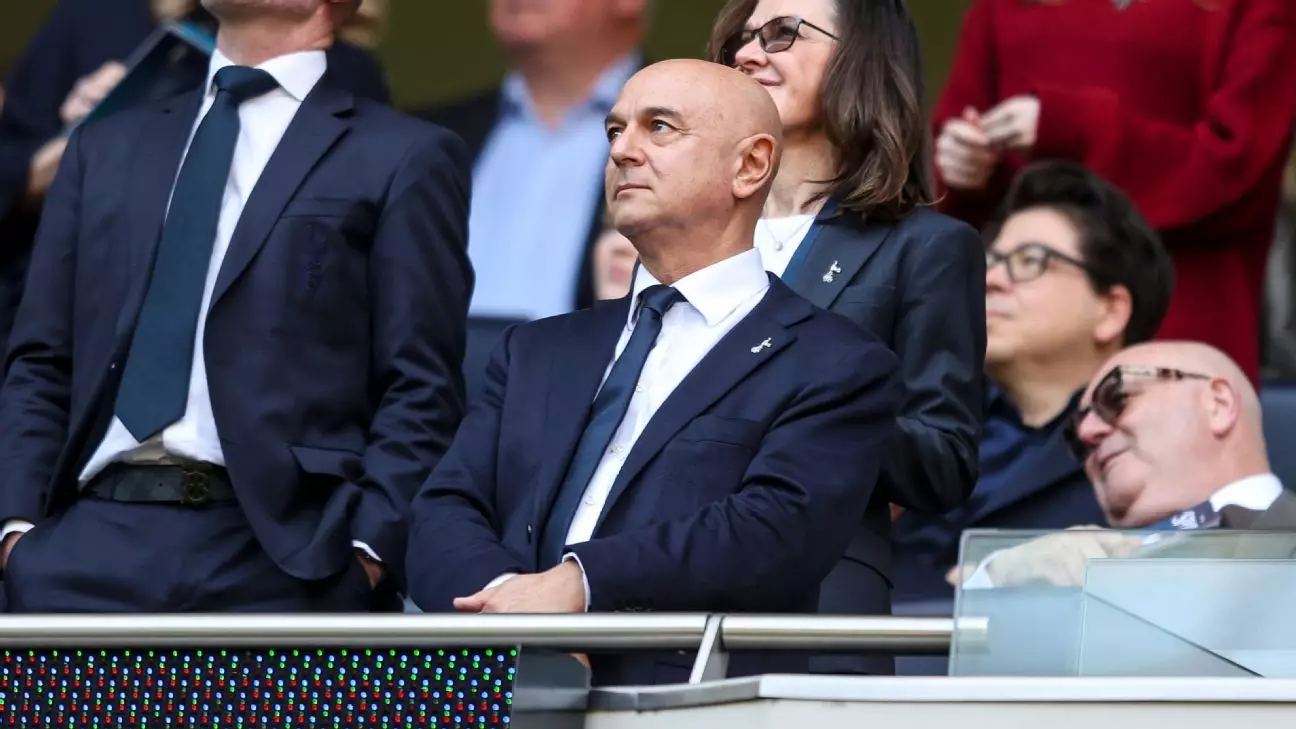Tottenham Hotspur has found itself navigating stormy waters this season, enduring a frustrating period marked by lackluster performances on the pitch. Currently sitting 14th in the Premier League, the club seems to be caught in a whirlwind of unmet expectations from fans. Many supporters have voiced vehemently their displeasure with Chairman Daniel Levy and the ownership group for what they perceive as a failure to prioritize success through adequate transfer spending. As Spurs plunge deeper into this challenging campaign, they cling to their last lifeline: the Europa League. This scenario presents both a desperate hope for glory and a reflection of the broader struggles enveloping the club.
Financial Transparency and Accountability
Amid criticism, Daniel Levy has defended the club’s stance on financial prudence, emphasizing that significant investments have been made in player acquisitions since the opening of the new Tottenham Hotspur Stadium in April 2019. In a recent statement tied to the club’s volatile financial performance, Levy outlined that Spurs have invested over £700 million in new players, striving to build a competitive squad. This claim, however, has led to mixed reactions among fans, with some appreciating the focus on the club’s economic stability, while others remain frustrated by what they perceive as inadequate ambition.
Levy’s insistence on sustainable spending reflects a philosophy rooted in fiscal responsibility, especially in the current climate of increasing transfer fees and salaries. He criticizes calls for more aggressive spending, arguing that the club cannot operate outside its financial means. This approach prioritizes long-term stability over short-term glories, a stance that, while commendable, raises questions about whether it will engender resentment among a fanbase craving immediate success.
The Shifting Dynamics of Club Performance
Tottenham’s year has been mixed, marked by significant shifts within the squad. The departure of talismanic striker Harry Kane to Bayern Munich left a void that has yet to be filled adequately. Despite the arrival of promising talents like Micky van de Ven and James Maddison, the team has struggled to find consistent form. These contrasting fortunes lead one to question whether Levy’s commitment to financial sustainability truly aligns with the club’s on-pitch ambitions.
The club’s revenue report reveals a 4% decrease, underscoring the impact of factors such as an eighth-place finish last season, which excluded them from European competition and severely limited their prize money. The financial strain contrasts sharply with the vision for the club, leading to inevitable friction between the boardroom and supporter expectations.
The Duality of Hope: Men’s and Women’s Teams
In an encouraging subplot, both the men’s and women’s teams have shown glimpses of talent, yet they are engulfed in their respective struggles. The men’s team, managing to reach the quarter-finals of the Europa League, still faces overwhelming pressure to revive their domestic form. As they vie for a route back to the UEFA Champions League, the stakes intensify with each passing match, creating an environment where triumph becomes not merely desirable, but essential.
On the women’s side, the team’s journey mirrors the men’s in certain aspects, albeit with its challenges. Under coach Robert Vilahamn, the women reached the FA Cup final, showcasing resilience amid adversity. Yet, they too find themselves mired in uncertainty and inconsistency, currently languishing in the lower regions of the Women’s Super League. The whispers of coaching instability keep the pressure high, as fans remain keenly aware of the dual stakes resting on the shoulders of both teams.
Longing for Connection and Consistency
Resilience and passion for the club have never been questioned; what lingers is the desire for connection and consistent success to uplift the Spurs community. Levy’s expressions of gratitude toward loyal supporters resonate, but the underlying frustration stemming from a perceived disconnect between financial decisions and sporting success threatens to fracture this relationship. Fulfilling the promise of a sustainable, competitive squad is pivotal not only for the club’s brand but for re-establishing trust with its spirited fanbase.
These turbulent times demand a delicate balance of ambition, financial prudence, and genuine strategic foresight. Tottenham’s ability to extract itself from this precarious position hinges on wise investments and a firm commitment to unifying the club’s vision—one that reconciles the echoes of past glories with the urgent needs of the present. As they face formidable opponents like Chelsea and Aston Villa on the horizon, Spurs must galvanize their efforts to ensure they emerge with both pride and purpose intact. The hope remains that the challenges faced today will translate into the triumphs of tomorrow.

